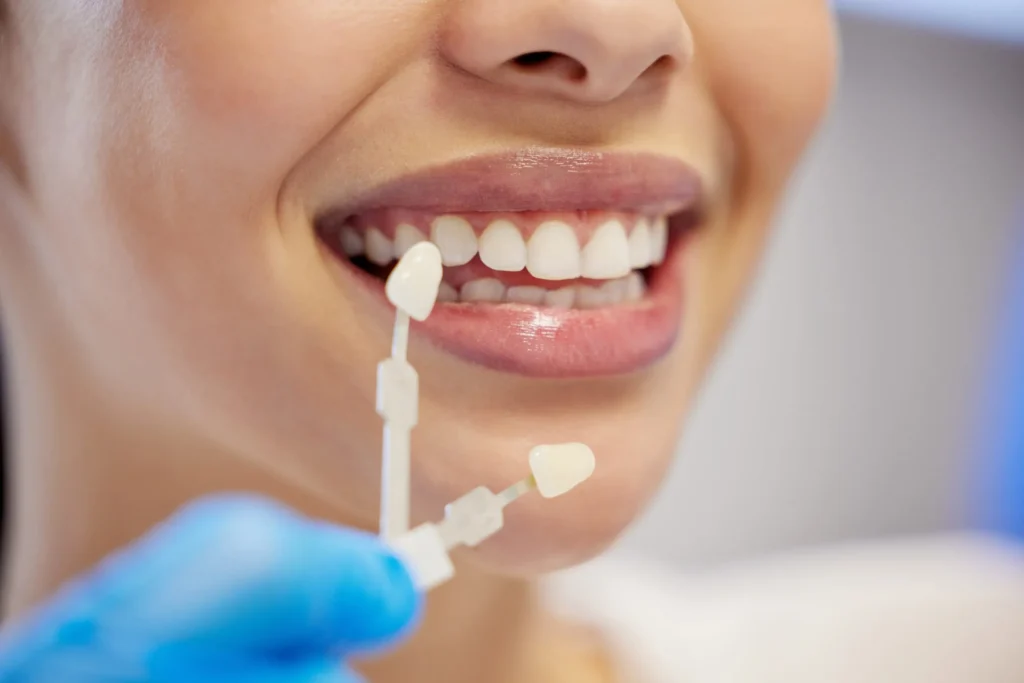If you’ve struggled with enamel hypoplasia or weak enamel, you know how frustrating it can be to deal with chronic tooth sensitivity, discoloration, and a smile that doesn’t reflect your confidence. But there’s good news: porcelain veneers can offer an effective, aesthetic, and protective solution.
In this guide, we’ll explore how veneers can help patients with enamel deficiencies, the benefits they offer, the candidacy requirements, and what to expect from the procedure.
🦷 What Is Enamel Hypoplasia?
Enamel hypoplasia is a developmental defect where the outer layer of the tooth — the enamel — forms incompletely or is thinner than normal. It can affect one or several teeth and appears as:
- White, yellow, or brown discoloration
- Grooves, pits, or ridges in the enamel
- Chronic tooth sensitivity
- Increased risk of tooth decay and wear
Causes may include:
- Genetic conditions (e.g., amelogenesis imperfecta)
- Prenatal malnutrition or illness
- High fever during childhood
- Trauma to developing teeth
- Exposure to certain medications or chemicals
🔬 Weak Enamel vs. Enamel Hypoplasia
While enamel hypoplasia refers to defective enamel formation, weak enamel can develop over time due to:
- Acid erosion (from soda, citrus, GERD)
- Aggressive brushing
- Poor oral hygiene
- Tooth grinding
Both conditions compromise the strength, appearance, and longevity of natural teeth — making cosmetic and protective treatments like veneers a strong consideration.
✅ Are Porcelain Veneers a Good Option for Patients with Enamel Issues?
In many cases, yes — porcelain veneers can be an ideal solution for covering enamel defects and protecting the teeth underneath. However, your eligibility will depend on the amount of remaining healthy tooth structure and your overall oral health.
💡 Benefits of Veneers for Enamel Hypoplasia or Weak Enamel
1. Improved Aesthetics
Veneers cover discoloration, pitting, and surface irregularities, offering a smooth, white, natural-looking smile that feels completely renewed.
2. Protection from Further Wear
Veneers act as a barrier against acidic, mechanical, and bacterial damage, helping preserve what’s left of your natural enamel.
3. Reduced Tooth Sensitivity
Many patients with weak enamel or hypoplasia experience sharp sensitivity to hot, cold, and sweets. Veneers seal the tooth surface, often reducing or eliminating this discomfort.
4. Boosted Confidence
A compromised smile can deeply affect self-esteem. Veneers can restore not only function but also your confidence to smile freely.
🧑⚕️ Candidacy: Can You Get Veneers If You Have Weak Enamel?
You may be a good candidate for veneers if:
- You have enamel hypoplasia or thinning enamel without extensive decay.
- Your teeth have no active infections, gum disease, or structural instability.
- You have enough underlying tooth structure to support the veneer.
- You are not a heavy grinder (or are willing to wear a nightguard).
- You practice or are willing to adopt excellent oral hygiene habits.
If your enamel loss is too advanced, your dentist may recommend crowns instead, which offer full coverage protection.
🔄 The Veneer Process for Enamel-Compromised Teeth
- Initial Consultation:
Your dentist will examine your teeth and determine if veneers are appropriate. X-rays or photos may be used to assess enamel thickness. - Preparation:
Only a minimal amount of enamel is removed — often less than 0.5mm. In cases where enamel is already deficient, very little shaping may be required. - Impressions & Fabrication:
Your veneers are custom-designed for shape, color, and fit. Temporary veneers may be placed while your permanent ones are being made. - Placement:
The veneers are bonded to your natural teeth using strong dental cement. The process is virtually painless and delivers instant results.
⚠️ Special Considerations for Weakened Enamel
- Minimal-Prep Veneers: Patients with limited enamel may benefit from minimal-prep or no-prep veneers, like Lumineers, which require little to no tooth reduction.
- Gum Health Monitoring: Enamel deficiencies can increase plaque accumulation, so maintaining healthy gums is crucial.
- Nightguards for Bruxism: If you grind your teeth, wearing a custom nightguard can prevent veneer damage.
🧴 Aftercare Tips for Long-Lasting Veneers
- Use a soft-bristled toothbrush and non-abrasive fluoride toothpaste
- Avoid extremely hard or sticky foods that may damage the veneer
- Minimize consumption of acidic and sugary drinks
- Visit your dentist every 6 months for cleanings and checkups
- Wear a nightguard if you grind your teeth at night
📝 Final Thoughts
If you suffer from enamel hypoplasia or weak enamel, you don’t have to live with discomfort or an unsightly smile. Porcelain veneers offer a cosmetic and protective solution that restores beauty and function — often with life-changing results.
Working with an experienced cosmetic dentist is key to getting the best outcome. With proper care, your veneers can last 10–15 years or more, providing a confident, pain-free smile that truly lasts.




